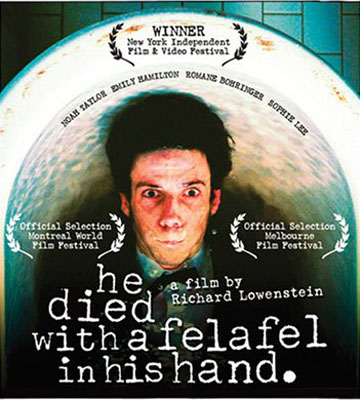

Director: Richard Lowenstein, 2001.
Despite winning multiple awards, this is not a very funny film. Neither is it tasteful, being unnecessarily filled with foul language from start to finish. Film Movement has distributed some excellent foreign or unknown films (such as Arranged, Witnesses, and Ben-X -- watch for reviews of these latter two films in the next 2 weeks), but it has had some misses too, and this is the worst so far.
It starts off with a golf scene. A man stands with his golf club about to drive. But when he calls "Fore," instead of a ball he hits a bull-frog. Shocking and hilarious, this is as funny as it gets. After this, it devolves into a dreary film with few laughs.
 The story-line revolves around "room-mates from hell" in eastern Australia. These room-mates include: foul-mouth "bruces" doing drugs and seeking sex; a chaos-inducing Russian lesbian who creates trouble for all; a homosexual coming out to no surprise; a self-absorbed soap actress; and a Japanese student who is given a broom-closet for a room.
The story-line revolves around "room-mates from hell" in eastern Australia. These room-mates include: foul-mouth "bruces" doing drugs and seeking sex; a chaos-inducing Russian lesbian who creates trouble for all; a homosexual coming out to no surprise; a self-absorbed soap actress; and a Japanese student who is given a broom-closet for a room.Danny (Noah Taylor), a wannabe writer whose highest career aspirations are to write a sordid story for Penthouse to earn "25 gees" (25,000), is a semi-loser who is followed around from apartment to apartment by these full-blown losers. It has the potential for great comedy, but falls flat. It dies with a bloated and under-used cast in its hand.
Two scenes offer small ethical nuggets worth pondering. In the first, Danny is talking to Flip, one of the weird room-mates who is "moon-tanning." He asks Flip, "Do you ever wonder if it's all a big con Flip? This. Everything. What if none of it really exists? What if it's like some big experiment and we're like ants trapped in a giant petri dish?" He senses something bigger than himself, than his humanity. But rather than seeing the order and purpose built into creation by God, he sees chaos and disorder. He questions his existence.
To question our existence, to ponder the purpose of life, is at the very heart of philosophy and religion. Is there more than simply existing, living and dying? Is there really a higher life-form looking down on us? Yes indeed! There is a God. There is God. If we truly pursue this line of questioning looking at the evidence, we will discover that there is a God who has brought all things into being. He looks at us, but he does so in love and mercy. We are not ants, we are people created in his image (Gen. 1:26). And this gives life meaning and purpose. It also helps us realize we will spend eternity with him, if we choose to follow him in this life.
The second ethical nugget is related to the first. When a Melbourne detective lines Danny and friends up against a wall to ask them questions, he waxes philosophic: "When things fall out of balance, you know what happens then don't you Daniel. Your spiritual values start to decline. You get your disintegration of your social structure, don't you? The system collapses." As the spiritual values that underpin society decline, social order does decay. We have seen evidence of this throughout history. But what is happening with spiritual values today?
Paradoxically spiritual values are on the ascent and the descent simultaneously in America and perhaps elsewhere. Tim Keller, in his book The Reason for God, says "both secular skepticism and religious faith are on the rise in significant, powerful ways." The new atheism and agnosticism, themselves "religions" based on faith, are growing. Islam is exploding exponentially around the globe carrying its spiritual values to its followers. And in the Christian community, while the older mainline denominations are dying with their aging congregations, emerging (not emergent) churches are blossoming as they retain Scriptural authority while balancing truth with love. They are reaching a new generation with a very relevant gospel of Jesus. For society to remain healthy and strong, there must be values that are outside of ourselves, a set of spiritual values. Moral relativism is a failed experiment.
He Died with a Felafel in his Hand did not entertain or educate me. On the whole it simply wasted two hours of my life. Yet, even this dismal movie managed to touch a couple of nerves that caused me to reflect on deeper issues. I don't recommend you sitting through this movie. But perhaps this review has touched a nerve for you.
Copyright ©2008, Martin Baggs

No comments:
Post a Comment